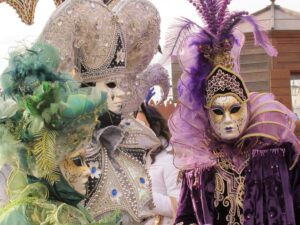Mardi Gras, or Fat Tuesday in English, is a bright and enticing celebration that draws visitors from all over the world with its grandiose parades, vibrant masks, and sumptuous feasts. Fat Tuesday is a magnificent occasion that captures the mood of indulgence before the solemn season of Lent. It originated from ancient pagan rituals and eventually became entwined with Christian observances. The history, traditions, and significance of Fat Tuesday will all be covered in this blog post as we examine the diverse cultures and celebrations that give this day its extraordinary character.

1. Historical Roots and Evolution
The roots of Fat Tuesday can be found in early Roman festivals such as Saturnalia and Lupercalia, which were known for their lavish feasting and revelry. As Christianity gained popularity, this practice was modified to coincide with Lent, a 40-day period of fasting and penance before Easter. Fat Tuesday was the last day of celebration before the beginning of the serious Lenten traditions. This blending of cultures and traditions gave rise to the colorful and diverse holiday we know today.
2. Carnival: A Global Extravaganza
While Fat Tuesday is celebrated around the world in many different ways, the Brazilian Carnival is arguably its most famous form. Every year millions of people flock to this grand and noisy festival, which is held in places like Rio de Janeiro and Salvador. Dressed in lavish costumes, pulsating rhythms and artfully constructed floats, the samba dancers create an explosion of color and intensity, celebrating life, freedom and unity.
The beautiful canals and historic streets of Venice, Italy, transform into a land of mystery and enchantment during Carnevale di Venezia. The famous Venetian masks, decorated with jewels, feathers and elaborate designs, evoke the city’s illustrious past and foster a sense of mystery and anonymity.
Mardi Gras celebrations in New Orleans, Louisiana, United States are famous for their grand parades, colorful costumes and energetic street acts that perfectly reflect the spirit of this joyous day. The distinctive decorations of multicolored beads, doubloons and ornate masks add to the festive mayhem that characterizes the city’s festivities.
3. Traditional Treats: Savoring the Flavors of Fat Tuesday
Without delicious goodies to indulge in, a celebration would not be complete, and Fat Tuesday is no exception. This day is associated with eating fatty and decadent dishes in many cultures, signifying the last celebration before the fasting days of Lent.
A mainstay of Mardi Gras in New Orleans is the circular pastry known as the “King Cake,” which is covered in icing and painted with bright decorations. The person who finds the hidden figurine or bean, which is a little figurine or bean, is dubbed the “king” or “queen” of the celebration. This delectable dessert encourages friendly rivalry and friendliness among family members and friends.

Deep-fried pastries, called pcszki, are a specialty of Poland, filled with savory ingredients such as fruit preserves, custard or cream. Ingredients such as sugar, lard, and eggs were traditionally used before the fasting season of Lent began. These pastries have developed over the years into a cherished Fat Tuesday tradition, enjoyed for both their scrumptious taste and historical significance.
4. Embracing the Spirit of Celebration
Fat Tuesday is a celebration of life, culture, and the human spirit; it is not just a one-day event. It serves as a reminder of the value of cooperating, getting past differences, and savoring the delight of the present. Fat Tuesday invites you to accept the attraction of indulgence and to fully experience life’s pleasures, whether you’re dancing in the streets of Rio, exploring the maze-like canals of Venice, or getting lost in the vibrant parades of New Orleans.
Conclusion
Fat Tuesday is a symbol of the persistent influence of custom, culture, and festivity. This day captivates and connects people via the shared experience of indulgence and festivity, from its ancient pagan origins to its modern versions across the globe. Let us keep in mind the profound importance of getting together, celebrating joy, and making enduring memories that cut beyond boundaries and cultures as we take part in the festivities. So while we celebrate the essence of what it means to be human on this Fat Tuesday, let the music flow, the colors sparkle, and the flavors entice.
